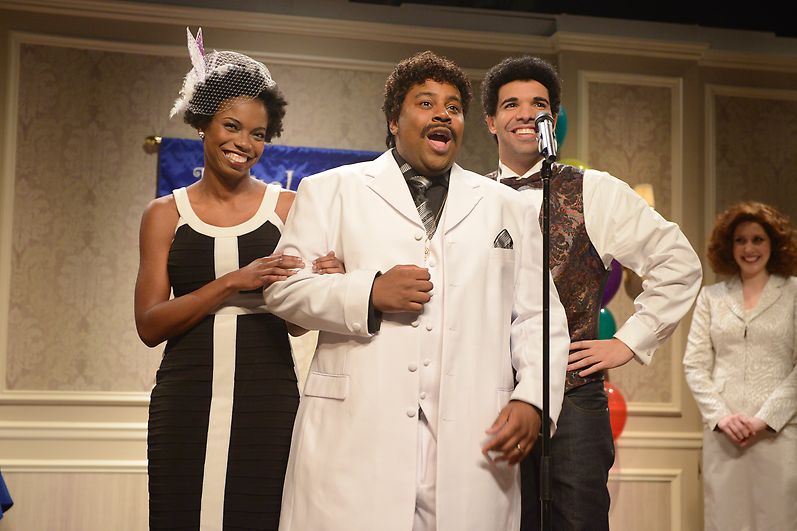
The burden of expectations Sasheer Zamata shouldered in her debut episode of Saturday Night Live must have been heavy indeed. The actor is the first black woman to join the regular cast of Saturday Night Live in six years. She is only the fifth black woman to join the cast in the show’s 38 year history. These figures make no sense, not in this day and age. And yet here we are.
In recent months, Saturday Night Live has been smug if not disdainful about the show’s lack of diversity. When Kerry Washington hosted, there was an arrogance to her cold open. The show mocked itself about the cast’s lack of black women. Then they offered a voice over explaining why Kerry Washington was playing so many roles in her opening skit. Saturday Night Live only began to address this problem for real when public outcry reached a fever pitch. Quietly, in the weeks after Washington’s episode, the show held auditions for a select number of black women. In addition to casting Zamata, they also hired writers LaKendra Tookes and Leslie Jones.
We’re supposed to call this progress. We are, I imagine, supposed to be grateful for this gesture. That is a mighty bitter pill.
Zamata has certainly paid her dues and has the necessary pedigree. She is a veteran of the Upright Citizen’s Brigade and has performed stand up across the country. She writes, acts and directs comedy sketches for various online outlets. She has also appeared in commercials for Target, Verizon, and Apple.
Despite her credentials, there was no margin for error. Zamata had to perform at her very best to receive a fraction of the consideration she deserves. She had to perform so well to have the necessary ammunition to combat the inevitable whispers (or shouts) about why she was hired. Saturday Night Live created an untenable situation and offered up this young woman as sacrifice.
Though popular actor turned rapper Drake hosted Zamata’s debut episode, all eyes were on her. It couldn’t be helped. I held my breath as the show began, wishing I could somehow help Zamata shoulder her unreasonable burden. I held my breath and hoped she was good enough while knowing, deep down, that for a woman in her position, there is no such thing as good enough. This story is familiar.
The show wasted no time in putting Zamata to work. She appeared briefly as a relative at Drake’s Bar Mitzvah. Her moment wasn’t enough to give us a sense of what she has in store for SNL viewers, but it was wonderful to see her bright, shining face so early on.
Zamata also performed in the second skit in a turn as Rihanna dancing the opening credits of Blossom. There was gyrating and Rihanna’s trademark vagina patting. Laughs were had. In fact, Zamata appeared in the majority of the show’s skits and acquitted herself well, though not every turn was memorable. In a skit where Zamata played a teenager having a slumber party interrupted by her father, her performance was underwhelming. She spent most of the skit rotating through a small range of facial expressions. Throughout the episode, Zamata’s talents were underused. She was never really allowed to go full throttle and chew up the scenery. All in good time, perhaps.
To the show’s credit, Saturday Night Live didn’t belabor the points of Zamata’s addition to the cast or the show’s “diversity problem.” Overall, the episode was solid, though the second half waned. For the first time in years, I found myself laughing aloud during the show. Zamata’s performance exceeded my expectations — though I worry I was so ready to see a black woman on the show that too little would still be enough.
I am angered by what has become enough.
Nonetheless, Zamata’s debut episode reveals what those of us who champion diversity have always known — diversity does bring about positive change. It is no accident that Zamata’s debut episode was one of Saturday Night Live’s strongest episodes in years. What so often gets lost in these conversations is that expanding the diversity of the cast and writers will expand the diversity of thought and experience that informs the show’s writing. Diversity can only make the show better.
It is somewhat absurd that the lack of diversity on a late night sketch show has dominated so much of the cultural conversation, but this story is also a stark measure of the unbearable whiteness of mainstream television and the unwillingness of those in power to change the status quo.
Saturday Night Live has made progress with their recent hires but questions remain. Diversity is not merely black and white. When will the show feature a cast and writing team with even broader diversity? When will we have to stop counting the people of color on shows like SNL? When will actors of color stop having to shoulder such unreasonable burdens?
In the coming days, there will be frenzied discussion about how Sasheer Zamata performed in her debut. We know two things for sure — she rose to the occasion with confidence and grace, and she never should have had to.
More Must-Reads from TIME
- Donald Trump Is TIME's 2024 Person of the Year
- Why We Chose Trump as Person of the Year
- Is Intermittent Fasting Good or Bad for You?
- The 100 Must-Read Books of 2024
- The 20 Best Christmas TV Episodes
- Column: If Optimism Feels Ridiculous Now, Try Hope
- The Future of Climate Action Is Trade Policy
- Merle Bombardieri Is Helping People Make the Baby Decision
Contact us at letters@time.com